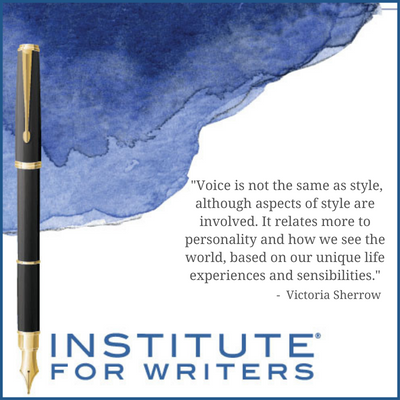1000 N. West Street #1200, Wilmington, DE 19801
© 2024 Direct Learning Systems, Inc. All rights reserved.

Editors often refer to an author’s “voice” and say they enjoy discovering “new voices” and “fresh voices.” Readers notice this element, too, although they might not talk so much about it. All writing has content—the “what” of our writing. How we say it—the writing choices we make—that’s where voice comes into play.
 Voice distinguishes one writer’s work from another’s, even if both of them wrote about the same topic. Sometimes we can identify an author by seeing just a few sentences. A passage from Ernest Hemingway doesn’t sound like the writing of Mark Twain or William Faulkner, for example. And none of those authors sounds like Virginia Woolf, Agatha Christie, Toni Morrison, Stephen King, Sandra Cisneros, John Grisham, or Jodi Picoult.
Voice distinguishes one writer’s work from another’s, even if both of them wrote about the same topic. Sometimes we can identify an author by seeing just a few sentences. A passage from Ernest Hemingway doesn’t sound like the writing of Mark Twain or William Faulkner, for example. And none of those authors sounds like Virginia Woolf, Agatha Christie, Toni Morrison, Stephen King, Sandra Cisneros, John Grisham, or Jodi Picoult.
As for nonfiction, who would confuse any of these author’s writings with the work of the others—Will Rogers, James Baldwin, Dave Eggers, Paula Fox, Sharifa Rhodes-Pitts, or Rebecca Skloot? Readers often clamor for new works by their favorite authors because they enjoy spending time with that “voice.”
Voice is not the same as style, although aspects of style are involved. It relates more to personality and how we see the world, based on our unique life experiences and sensibilities. In Fiction First Aid, Raymond Obstfeld compares an author’s voice to Aristotle’s definition of “essence,” writing, “The essence of something is that special quality without which that something would no longer be what it is.” According to Polly Campbell, author of How to Reach Enlightenment, “Voice is the piece of personality you leave on the page. It’s the quality that gives your writing a memorable and distinctive sound.”
In his book Storycraft: The Complete Guide to Writing Narrative Nonfiction, Jack Hart discusses two ways in which an author’s personality relates specifically to nonfiction: the persona of the writer and the position or narrative distance of the writer in relation to the true story. The author’s voice can reflect their attitudes, values, dreams, emotions, struggles, beliefs, likes, and dislikes.
Writers express their distinctive voices through their vocabulary and word choices, as well as the ways they arrange words, structure sentences, and use punctuation to add shades of meaning. The tone, rhythm, pacing, and use of imagery are likewise important.
But what triggers the choices each writer makes? Where does that special voice come from? Author Polly Campbell says, “The artistic flair isn’t something you concoct, it’s something you release.” Other pros echo this idea, saying that we already have a unique voice; it is a part of us. We just need to develop it and let it come through when we write.
A distinctive voice offers important benefits for nonfiction writers. Award-winning author Milton Meltzer says, “The best writers of nonfiction put their hearts and minds into their work. Their concern is not only with what they have to say but how they say it.”
The writer’s voice can add legitimacy when the subject involves real life. Richard D. Bank, author of The Everything Guide to Writing Nonfiction, explains, “In writing nonfiction, the voice is critical because the reader is asked to trust and believe that the material is true. The voice must be one of authority or at least be honest and believable.” In Storycraft, Jack Hart agrees: “If we’re committing to a guide who promises us a revealing journey through the real world, we want a leader with authority and expertise.”
As with fiction writing, the author’s voice needs to engage the reader. In Finding Your Voice: How to Put Personality in Your Writing, Les Edgerton notes that “a reader may initially be attracted because of the subject or to the basic ‘facts’ revealed, but unless the author provides a personality to the material, many won’t stick around till the end.” He adds, “By being yourself on the page, you’ll more than likely attract more readers because of your individuality than you would by hiding your personality behind a neutral style.”
 Jane V. Blanchard, author of Women of the Way, writes about the importance of voice in her travel writing: “I aim to use voice and descriptions to make my readers feel as if they are with me and seeing what I see. To be successful with this, I need to be honest and believable in my writing. I need to find my voice.”
Jane V. Blanchard, author of Women of the Way, writes about the importance of voice in her travel writing: “I aim to use voice and descriptions to make my readers feel as if they are with me and seeing what I see. To be successful with this, I need to be honest and believable in my writing. I need to find my voice.”
Of course, an author’s voice might change slightly, depending on the subject matter. Says author Kori Morgan, “The voice of a nonfiction piece varies according to its purpose. In nonfiction narratives, the storytelling element produces a unique voice that gives readers a sense of the author’s style and personality. Even though he didn’t invent the events of his nonfiction book In Cold Blood, Capote’s voice as a fiction writer is very much present. Informational text, though, incorporates a common voice that is inviting, accessible to all audiences and unbiased. Since the audience could be anyone interested in the topic, the text needs to be understandable to a variety of people.”
So how do you nurture your own voice and let it infuse your writing? Experienced writers offer practical suggestions, such as advising writers to improve their craft, train their awareness, and choose subjects they care about. Many also suggest writing first drafts freely, without stopping to edit and revise yet, in order to give ourselves more creative space.
Avoid the trap of comparing your writing to that of others. Yes, we admire the “greats” and we have our literary heroes. But they have their own voices and we have ours. Similarly, don’t stifle your natural voice in order to achieve what inexperienced writers might regard as a “writerly” style.
Les Edgerton warns writers to beware of “Critic Nag Dude” when you write. The “Dude” may be present if you find yourself imitating other writers or questioning everything you write, due to self-doubt and what Edgerton calls the “writer’s inferiority complex.” It may also show up in a tendency to avoid writing about people, places, and things you know well in favor of exotic places and lifestyles you’ve never experienced. Maybe, thinks the writer, those familiar places and situations aren’t “good enough?” Valuing our own experiences and perspectives can help to free our writing voice.
A proven way to gain confidence, of course, is to study the craft. Mastery of language and solid basic skills can make it easier to relax and write. Says author Janet Burroway, “Don’t worry about ‘finding your voice.’ Worry about saying things as clearly, precisely, and vividly as you can. Make your language as rich, flexible, and varied as you can make it. In other words, seek to voice and your voice will follow.”
In their classic text The Elements of Style, William Strunk, Jr. and E.B. White said simply, “As you become proficient in the use of language, your style will emerge because you yourself will emerge.”
Of course, that requires writing practice. So: Read. Learn your craft. Write, write, write. Then, as the song says, “Let It Go!” Let your natural self come through, and you may be one of the “fresh voices” that captivate both editors and readers.
Ready to work on developing your writer voice? Let our one-one instructors show you how! Take our assessment and be matched with a mentor to fit your goals!
Victoria Sherrow has published short stories, articles and books (fiction and nonfiction) for readers aged preschool through adult. Her books have received starred reviews and been honored by the American Library Association, Parents Choice Gold Award, National Association for the Advancement of Science, and NYPL Best Books for the Teenage, among others. Victoria has taught at The Institute of Children’s Literature for more than 25 years and has also been an assistant editor and writing contest judge. Recently, she revised and polished a 230,000-word book for adults.
1000 N. West Street #1200, Wilmington, DE 19801
© 2024 Direct Learning Systems, Inc. All rights reserved.
1000 N. West Street #1200, Wilmington, DE 19801
© 2024 Direct Learning Systems, Inc. All rights reserved.
1000 N. West Street #1200, Wilmington, DE 19801
© 2024 Direct Learning Systems, Inc. All rights reserved.
1000 N. West Street #1200, Wilmington, DE 19801
© 2025 Direct Learning Systems, Inc. All rights reserved.
1000 N. West Street #1200, Wilmington, DE 19801
©2025 Direct Learning Systems, Inc. All rights reserved. Privacy Policy.
3 Comments